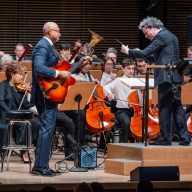 Emma Watson plays one of a group of real-life teens who stole from celebrities in Sofia Coppola’s “The Bling Ring.”
Emma Watson plays one of a group of real-life teens who stole from celebrities in Sofia Coppola’s “The Bling Ring.”
Credit: A24
‘The Bling Ring’
Director: Sofia Coppola
Stars: Emma Watson, Israel Broussard
Rating: R
2 (out of 5) Globes
Sofia Coppola is perhaps the only filmmaker who could make anything out of the true life titular gang in “The Bling Ring,” namely a coterie of teens who broke into celebrities’ homes, making off with millions worth in designer clothing and cash. What is there to say about? The story speaks for itself about materialism and the banality of (moderate) evil in the age of social media. Anything else would be too obvious, mere underlining. The best way to handle it, if one must at all, is to embody the subjects’ braindead thirst for fancy stuff. The characters in “The Bling Ring” don’t think, they just do. If Google allows them to find Paris Hilton’s house, and if she broadcasts on Twitter she’ll be DJing a club on such a night, then it follows they must break in and steal her fancy clothes — although perhaps not her dog.
For about an hour, Coppola’s sixth feature is hypnotic. That’s not because of the filmmaking, which is less ostentatiously minimalist than in “Somewhere. That film found her finally paying homage to Chantal Akerman, whose epic “Jeanne Dielman” includes such sequences as a four-minute shot of someone skinning potatoes. It’s because it has an overall flatness, in style and judgment. The camera stares dead-eyed at the questionable activities of the group, which includes nice guy/unreseolved metrosexual Nick (Israel Broussard), enabler Rachel (Katie Chang) and a Valley Girl (Emma Watson) home-schooled not by a Christian fundamentalist but by a devotee of The Secret (Leslie Mann).
That last joke is a bit too broad for such an intentionally one-note film. Indeed, there are times, when Coppola is having its dim characters strut about in stolen duds in slow-mo to gangsta rap, that the film feels more like Todd Solondz than the director of “The Virgin Suicides” and “Lost in Translation.” It’s not that Solondz is beneath her; he’s just a different, polarizing filmmaker, and it’s distressing to see her try her hand at sour jokiness. Once our anti-heroes are busted, the film suddenly does take a stance. Watson’s pampered girl goes faux-remorse, wearing sensible outfits as she tells fawning journos about how she wants to head a charity. Nick becomes the fall guy, the victim of mean girls who are better at working a girl-obsessed media. Watson’s patently empty line readings, read in an ‘80s accent, are hilarious, but they’re from a different, sillier film. Coppola is great at portraying the laziness of wealth; when it comes to analyzing it, or other things, she’s as shallow as the characters she often depicts.
















